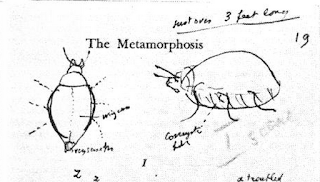Inside Out (dir. Pete Docter, 2015)
'Nothing is more important than for us to recognise that we are
bound
and sworn to what provokes our most intense disgust.' - Georges Bataille
I.
Arguably, disgust - as an expression of taste - betrays a high level of sensitivity and culture; an African dung beetle, for example, may be able to navigate by the stars, but it knows nothing of disgust.
But then neither does a Sadean libertine, who has vanquished all emotional responses that might be regarded as all too human and all forms of pleasure rooted in the senses over which they lack control. Sade terms this form of asceticism or Stoic indifference to the natural passions, apathy and it is central to his philosophy in the bedroom.
However, most of us are not Sadean libertines and do not posit apathy as an erotic ideal, nor strive to overcome our disgust for shit-eating (coprophagy) and corpse-fucking (necrophilia), for example, as signs of our superiority. We might even view apathy, in the end, as the way in which a madman seeks to justify his lack of remorse or compassion for others.
II.
Disgust, as Tina Kendall rightly says, "has long been a subject of anxious speculation" [1].
And as she also reminds us:
"Recently, there has been a revitalisation of debates pertaining to disgust from
across a range of disciplines, as witnessed by publications in the fields of
philosophical aesthetics, phenomenology, cognitive and moral psychology,
literary theory, and feminist and queer theory." [2]
Continuing:
"What unites
much of this interdisciplinary work on disgust is a shared concern with
thinking through the relations between bodily sensation, emotion, and
cognition [...] and with probing the political, moral, and ethical implications that arise
from those particular conditions of embodiment." [3]
That's true, I think, though I also agree with Martha Nussbaum, who suggests that what is most interesting about disgust is that it often acts as an intensifier of other negative emotions, such as anger or hatred.
But what is the origin of disgust: is it rooted in evolutionary biology, or is it primarily an emotional phenomenon - with an added moral dimension - that is determined culturally?
Darwin famously wrote on the subject and seemed to believe that disgust is an evolved response to potential dangers, such as rotten meat, or body products that can spread disease (such as excrement). This identifies disgust - mostly associated with our sense of smell and taste - as an important defensive mechanism, protecting us from pathogens, etc. It's not, therefore, the wholly irrational reaction that some people imagine.
But, of course, we can experience disgust for things we don't like the look or feel of too - and some people with particularly sensitive ears can even find certain noises disgusting (readers can provide their own examples, many of which will doubtless involve bodily functions).
There's extensive research evidence that women experience greater levels of disgust - including self-disgust and sexual disgust - than men. Again, there may well be physiological reasons for this, but it's surely something that has been socially reinforced.
There's also evidence that forms of visceral prejudice, such as racism and homophobia, are rooted in disgust and not just in ignorance, as many idealists like to believe - which is why education isn't the solution they hope it will be. In some cases, disgust for others is so overwhelming that it prevents individuals from self-examination or ever learning to love their neighbour.
Ultimately, the greater one's level of disgust, the greater one's level of hate for those who inspire such and the greater one's desire to do away with them; we recall once more the case of Gregor Samsa. Fascism is the collective political expression of disgust which denies not only the rights of other citizens, but their humanity, and this results (ironically) in the most disgusting acts and scenes imaginable.
And yet, disgust may also be the strong vital sensation that Kant said it was; one that prevents us from committing acts of atrocity or vile crimes.
Besides, as Walter Benjamin concluded, no one is ever completely free from disgust; not even the Sadean libertine, who never really overcomes their instinct of revulsion, merely redirects
it, so that, for example, they feel disgust for conventional forms of
love and moral behaviour.
In sum, and to quote Tina Kendall once more, disgust's complex and "distinctly polymorphic
nature" [4] as both a visceral reflex and a leared emotional response, makes it a "uniquely privileged concept" [5] and critical tool for thinking through a number of important issues.
The philosopher, therefore, can never just say eww! and look away from that which (rightly perhaps) revolts the non-philosopher living in Tunbridge Wells.
Notes
[1] Tina Kendall, 'Tarrying with Disgust', an Introduction to Volume 15, Issue 2 of the journal Film-Philosophy, ed. Tina Kendall, (Edinburgh University Press, Oct 2011), p. 1.
[2] Ibid.
[3-5] Ibid., p. 2.






